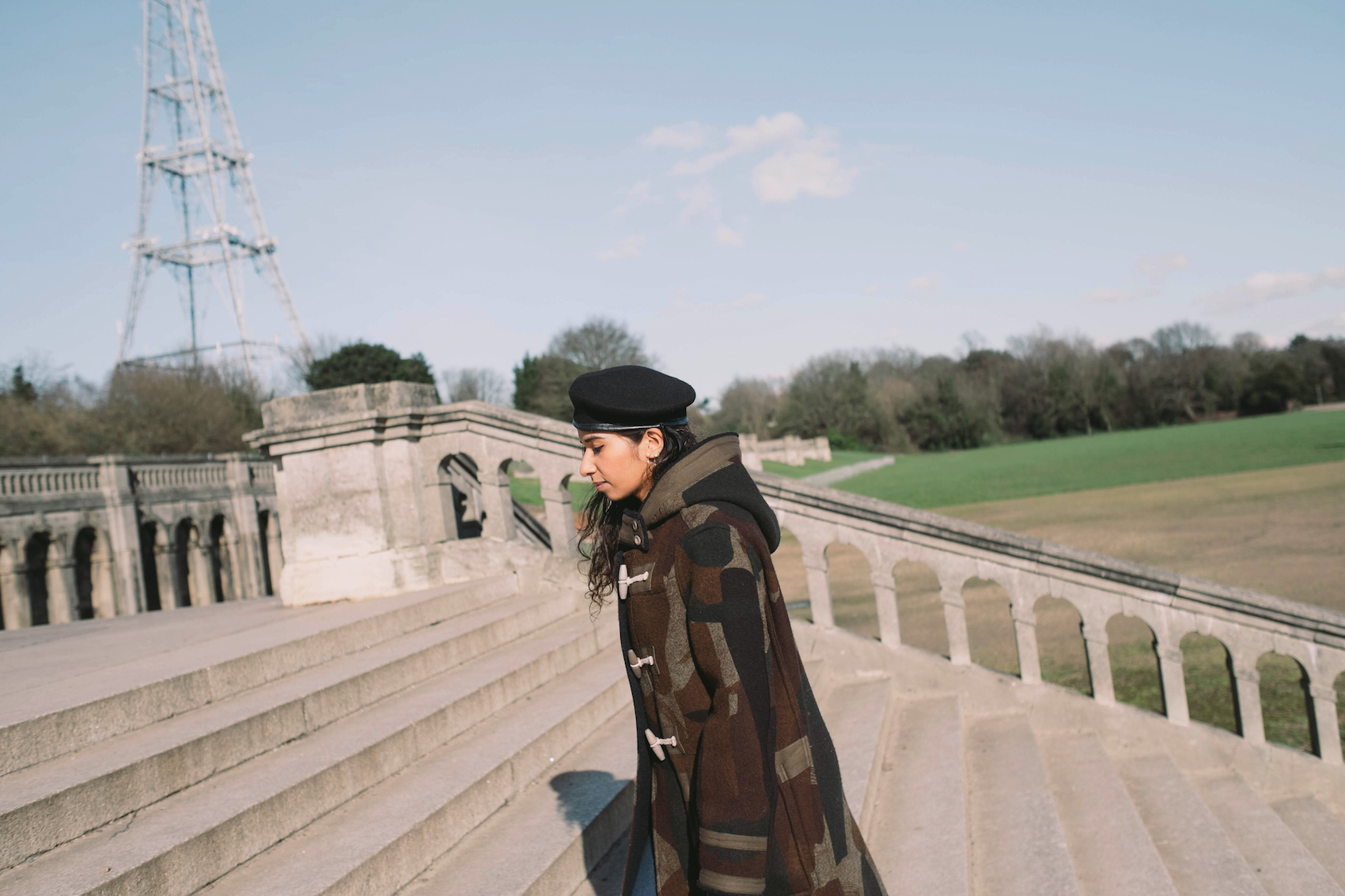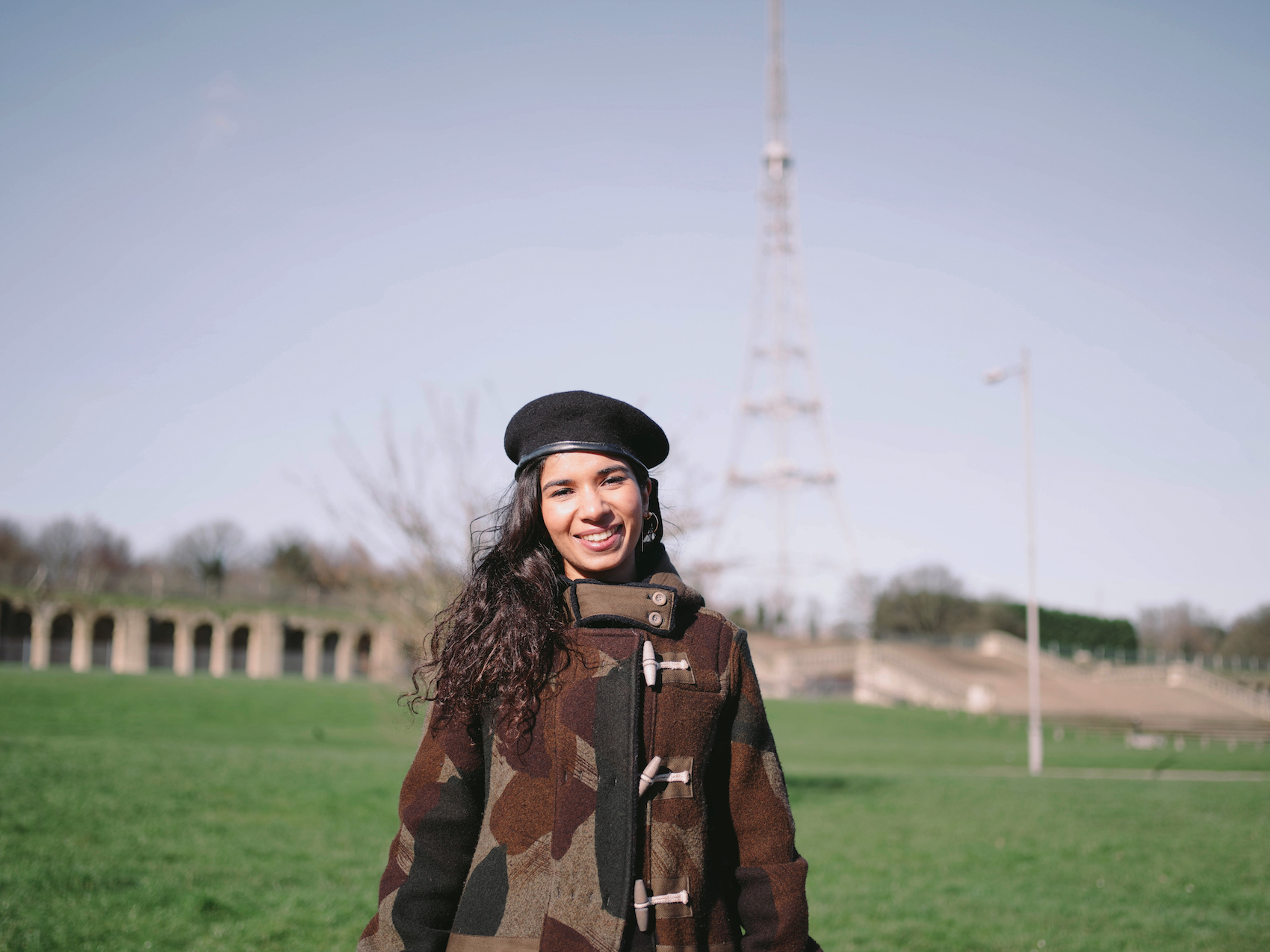Throwing Shade

I meet Crystal Palace-based producer and DJ Nabihah Iqbal, also known as Throwing Shade, in a small, noisy coffee shop in her local station. We chat about the great record shops and cafés in the Crystal Palace Triangle, and she shows me around the nearby park, where the infamous dragons - curious Victorian interpretations of the dinosaur - grace the greenery and half-emerge from ponds.
Iqbal is extraordinarily accomplished. By her own admission, she has studied, “quite a lot.” Growing up north of the river, she attended one of the best schools in the country, before going on to study a little-known course at SOAS in Ethnomusicology. After graduating, she completed an MPhil at Cambridge before converting to law, completing the bar and relocating to South Africa to work for a human rights’ organisation. Upon her return to London, while still working as a lawyer, her music career picked up via Soundcloud in a way aspiring musicians only dream of.
“I put a few tracks up and I didn’t think anyone would listen to them. But then I got an NTS show and I thought, ‘It’s now or never,’” says Iqbal. So she left the legal profession and took up music full-time, much to the chagrin of her parents. “They’re coming round to it. But you know, Asian parents, in their minds they thought I was going to be a lawyer and now I’m doing music and they’re just like ‘What the hell?’”
But Iqbal’s career has gone from strength to strength. This year, she is due to play South by Southwest in Texas (“a dream of mine”) and will release a 5-track EP, House of Silk, on Ninja Tune in March. When I meet her, she is working on a score for a Belgian indie film. “I don’t think it has a storyline. It’s strange but I like that because it gives me the same freedom with my music. The sound palette sounds like Throwing Shade but it’s more atmospheric. I’ve used guitar and some different instruments."
Iqbal’s creative persona is defined the eclectic, and derives from a deep, lifelong passion for music as well as her academic pedigree. Her regular NTS Radio show consistently incorporates music from all over the world, and spans all imaginable genres. Throwing Shade is so much a product of these competing influences that it has become otherworldly; its ineffable, ambient sound has been described as “cosmic RnB.”
Iqbal collects sounds wherever she goes. She would one day love to travel with the sole purpose of musical discovery, but “that hasn’t happened yet.” Instead, she incorporates music into all her itineraries. When I meet her, she has just returned from visiting family in Pakistan and is busy formulating a show based on her recordings there. A holiday to Jamaica provided the basis for one special edition of her show, and she once dedicated an entire show to Muslim Jazz, which became one of her most popular to date.
Iqbal is composed, accommodating and easy company throughout. Naturally relaxed, her demeanour is underscored by a steady professionalism, and she gives calm, assured responses to my, sometimes erratic, line of questioning. It strikes me that her manner in some way embodies the complexities of Human Rights’ lawyer turned musician à la mode.
But why did Iqbal make this change? I ask her if she feels 'weird' about the transition and she tells me 'weird' is not the right word. Pop music however, is a long-standing passion. She describes Michael Jackson as, “her first musical obsession,” retelling a story of a childhood spent watching the same Michael Jackson documentary “religiously” until the tape became worn out and had to be replaced.
Upon his untimely death, she was distraught: “My friends joke about it because I was crying so much. They’re like ‘How can you cry about Michael Jackson?’ but I still get really sad about it now. I wish he wasn’t dead.” The day afterwards, she paid homage to her late, great hero. “I went for a bike ride and I had a little ghetto blaster and was playing Michael Jackson on it, and everywhere around town you see people coming out onto the streets. There were a lot of people in Trafalgar square and around Soho, and people had put up signs in their windows. It was cool to see.”
Iqbal has a deep love for the city and designates it as the spiritual home for her competing, international influences. “I like Paris, New York, Berlin, Cape Town, but there’s just something about London. It will always be my favourite place. It’s got a great mix of people. I love how multicultural it is and how everyone just gets on with it. There’s lots of space to do your own thing. It’s the best place.”
She once played in the Tate Modern’s iconic Turbine Hall. “It was sick. There’s so much natural reverb and delay; I use those sorts of effects a lot in my music but I turned them right down and just let the space do it. From one end of the hall to the other end, there’s a 15 second delay. So when you come in through the doors it sounds like ‘sound soup’. I don’t think I’ll get to play in such a big place again.”
I imagine that she will. Much of Iqbal’s time is spent gigging these days, but she still goes out regularly; South East to Rhythm Section, Rye Wax and YAM Records in Peckham, and East London venues like Alibi, Birthdays, or Visions, "It’s a bit down and dirty, but it’s an important venue to me; it’s where I played my first ever gig as Throwing Shade”. She spends days at the Blue Mountain café in Penge, the Herne Hill Famers’ Market, and the Horniman Museum.
Keen to discover Iqbal’s less cool past-times, we discuss a shared adolescence spent hanging out wearing “really baggy trousers.” “Me and one of my best friends made a pact when we were 14 that we would always wear Criminal Damage trousers - that we’d never stop wearing those trousers, even when we’re 20. We laugh about it now.” While at university, she was in a noise band called Of For. "I don’t think there’ll be anything about that on the internet,” she laughs, “But we did play a few shows. We played at the ICA. That was cool.” Clearly, Iqbal’s awkward grungier moment was infinitely cooler than mine.
“You never see those kind of kids any more.” Iqbal bemoans, over tea, a growing modern homogeneity, in which the internet has “like, meshed everything together.” Although most chart music “does nothing for her,” she is a huge fan of Drake. She has a track called 4Drake which is her most-played song on Spotify, but I was amused to discover that Iqbal cited it as last year’s most underrated song in a Guardian Q+A. The intention of the track, as the name suggests, is that one day, he will hear it. “Drake is always doing different things and he makes tracks that become anthemic. When Hotline Bling came out, I listened to it on repeat, and when a Drake song comes on in a club, everyone just goes crazy. That’s quite an achievement.”
I ask her how she feels about the accusation that Drake’s lyrics, with their emphasis on “good girls,” are paternalistic, but she prefers to describe his sound as “Sexual Melancholy.” She is concerned however, about the potential for feminism in pop music. “I think we need to look more critically at the role of women in the music industry. They’re always scantily-clad and over-sexualised. People like Beyoncé or Nicki Minaj say, ‘Well it’s my choice, I’m just doing it because I want to,’ but their choice is defined by the structure that they’re in; it’s not really freedom of expression.”
Iqbal expresses this attitude in her tongue-in-cheek videos for Sweet Tooth and Honey Trap. In the former, topless men are drenched seductively in honey, cream and sprinkles; in the latter, Iqbal walks purposefully, fully-clothed, through glowing red scenery, where near-naked men bathe in rose petals. Think, a witty, inoffensive inversion of Blurred Lines. “There are some points where I really feel like I’m a girl in a male-dominated industry, but you’ve just got to believe in yourself and keep doing it. Don’t think that wearing tight, skimpy clothes is going to make a massive difference… I mean, it might but we’ve got to change that.”
The strength of Throwing Shade lies therein; she incorporates a certain academicism, an awareness, into her work that transcends making or playing music solely because it sounds good. But it does sound good - from her exceptionally diverse, feel-good radio shows, to her danceable live sets, to her evocative personal sound, Iqbal provides ear candy endowed with a knowledgeable dimension. Bright, natural and unpretentious, Nabihah Iqbal is a welcome addition to a flourishing, but testosterone-heavy, alternative music scene.
WORDS: Lizzi Sandel is a film student at Kings College London; she lives in Bermondsey but her heart belongs to Peckham.
PHOTOGRAPHS: Alex McLuckie







